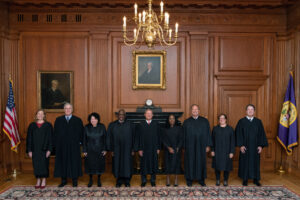
(Photo by Collection of the Supreme Court of the United States via Getty Images)
Justice Ketanji Brown Jackson made the legal news circles for arguing that race-conscious legislation is not facially unconstitutional because the 14th Amendment was ratified with race in mind. And while she’s definitely right, confidentially, I get the feeling that not everyone on the Court is going to agree with her! I’m not too big on betting, but I’d set the odds around… 6-3?
Adding fuel to my little hunch, the Supreme Court just decided to pass up on another matter that is definitely race conscious — the legacy of the Insular Cases. Per ABA Journal:

Humans in the Loop: The People Powering Trusted Legal AI
As the use of artificial intelligence permeates legal practice, a critical question confronts every legal professional who uses these tools: Can I trust this?
The U.S. Supreme Court on Monday denied certiorari in an appeal seeking to overturn the insular cases, a series of cases decided in the early 1900s that limited constitutional protections for people in some U.S. territories…At issue is a federal law that recognizes people born in American Samoa as U.S. nationals—giving them the right to work and travel here—but not U.S. citizens, according to the cert petition. Without citizenship, the plaintiffs can’t vote, can’t run for federal or state office, can’t serve on juries, and can’t serve as officers in the U.S. Armed Forces.
The 10th U.S. Circuit Court of Appeals at Denver had upheld the law based on the insular cases.
This is a blow to unexpectedly staunch Native Sovereignty advocate Neil Gorsuch.
Neil Gorsuch dissent in Castro-Huerta (inspired by @WritesForRent) pic.twitter.com/5Z8OSaweL0
— Joe Patrice (@JosephPatrice) July 1, 2022

Transform Legal Reasoning Into Business-Ready Results With General AI
Protégé™ General AI is fundamentally changing how legal professionals use AI in their everyday practice.
Justice Neil Gorsuch had called on the Supreme Court to overrule the insular cases in an April concurrence. Gorsuch said the “shameful” cases “rest on a rotten foundation” of “ugly racial stereotypes.”
Co-counsel in the Fitisemanu case was Neil Weare, president of Equally American, a civil rights organization. In an Oct. 17 statement, Weare said the cert denial “continues to reflect that ‘equal justice under law’ does not mean the same thing for the 3.6 million residents of U.S. territories as it does for everyone else.”
This cert denial comes despite the ABA pushing for the court to revisit these decisions. And while it is great to know that its heart is in the right place, they can’t even keep unqualified people off the bench, so it might not be the biggest mover when it comes to court decisions these days.
My hope is that the series of cases gets revisited, but I’m at a loss as to how that’s ever going to happen without changing the Justices on the Court or someone discovering that the jurisprudence disproportionately benefits people of color in some way — like that one time white folks decided to throw themselves under a mountain of debt just to make sure Black people were trapped down there with them.
Supreme Court Won’t Hear Appeal Seeking To Overturn Insular Cases [ABA Journal]
 Chris Williams became a social media manager and assistant editor for Above the Law in June 2021. Prior to joining the staff, he moonlighted as a minor Memelord™ in the Facebook group Law School Memes for Edgy T14s. He endured Missouri long enough to graduate from Washington University in St. Louis School of Law. He is a former boatbuilder who cannot swim, a published author on critical race theory, philosophy, and humor, and has a love for cycling that occasionally annoys his peers. You can reach him by email at [email protected] and by tweet at @WritesForRent.
Chris Williams became a social media manager and assistant editor for Above the Law in June 2021. Prior to joining the staff, he moonlighted as a minor Memelord™ in the Facebook group Law School Memes for Edgy T14s. He endured Missouri long enough to graduate from Washington University in St. Louis School of Law. He is a former boatbuilder who cannot swim, a published author on critical race theory, philosophy, and humor, and has a love for cycling that occasionally annoys his peers. You can reach him by email at [email protected] and by tweet at @WritesForRent.